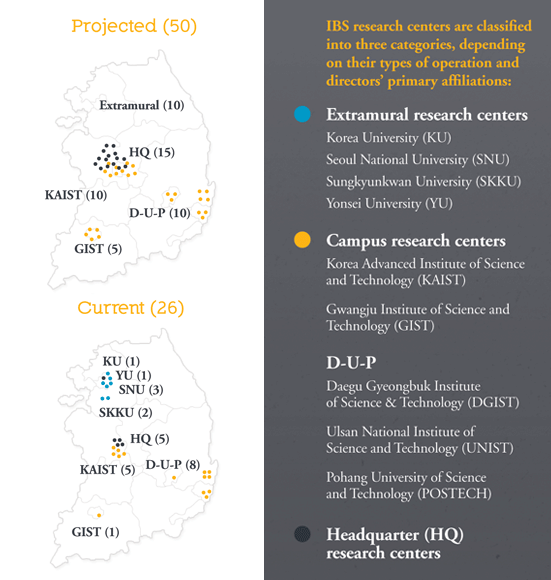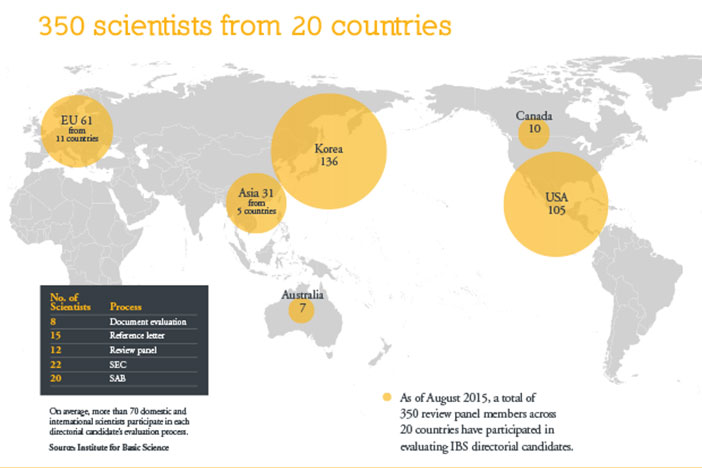주메뉴
- About IBS 연구원소개
-
Research Centers
연구단소개
- Research Outcomes
- Mathematics
- Physics
- Center for Underground Physics
- Center for Theoretical Physics of the Universe (Particle Theory and Cosmology Group)
- Center for Theoretical Physics of the Universe (Cosmology, Gravity and Astroparticle Physics Group)
- Dark Matter Axion Group
- Center for Artificial Low Dimensional Electronic Systems
- Center for Theoretical Physics of Complex Systems
- Center for Quantum Nanoscience
- Center for Exotic Nuclear Studies
- Center for Van der Waals Quantum Solids
- Center for Relativistic Laser Science
- Chemistry
- Life Sciences
- Earth Science
- Interdisciplinary
- Center for Neuroscience Imaging Research (Neuro Technology Group)
- Center for Neuroscience Imaging Research (Cognitive and Computational Neuroscience Group)
- Center for Algorithmic and Robotized Synthesis
- Center for Nanomedicine
- Center for Biomolecular and Cellular Structure
- Center for 2D Quantum Heterostructures
- Institutes
- Korea Virus Research Institute
- News Center 뉴스 센터
- Career 인재초빙
- Living in Korea IBS School-UST
- IBS School 윤리경영


주메뉴
- About IBS
-
Research Centers
- Research Outcomes
- Mathematics
- Physics
- Center for Underground Physics
- Center for Theoretical Physics of the Universe (Particle Theory and Cosmology Group)
- Center for Theoretical Physics of the Universe (Cosmology, Gravity and Astroparticle Physics Group)
- Dark Matter Axion Group
- Center for Artificial Low Dimensional Electronic Systems
- Center for Theoretical Physics of Complex Systems
- Center for Quantum Nanoscience
- Center for Exotic Nuclear Studies
- Center for Van der Waals Quantum Solids
- Center for Relativistic Laser Science
- Chemistry
- Life Sciences
- Earth Science
- Interdisciplinary
- Center for Neuroscience Imaging Research (Neuro Technology Group)
- Center for Neuroscience Imaging Research (Cognitive and Computational Neuroscience Group)
- Center for Algorithmic and Robotized Synthesis
- Center for Nanomedicine
- Center for Biomolecular and Cellular Structure
- Center for 2D Quantum Heterostructures
- Institutes
- Korea Virus Research Institute
- News Center
- Career
- Living in Korea
- IBS School
About IBS
| Title | Quantity to quality: How South Korea surged ahead through basic science | ||||
|---|---|---|---|---|---|
| Department | Department of Communications | Registration Date | 2015-12-11 | Hits | 14769 |
| att. | |||||
|
Quantity to quality: How South Korea surged ahead through basic science Academic Executive Brief, Elsevier (December 11, 2015) South Korea has achieved phenomenal economic growth over the past five decades, largely due to the Korean government’s strategic R&D investments. Huge budgets were allocated to adopt and adapt advanced technologies from abroad. This “follower” model allowed for Korea’s huge economic growth, but it had limitations. Mainly, it didn’t allow Koreans to develop our own technologies and industries, which in turn would enhance our economy. This situation has led to the need for increased national investments in basic science as an essential tool to further and sustain long-term economic development. A direct result of this new policy change, the Institute for Basic Science (IBS) was established in late 2011 to act as a focal point in our pursuit of advancing basic science.
The foundation of IBSThe Institute for Basic Science is located in the heart of South Korea, in Daejeon, with research centers spread throughout the country. As of 2015, we have 26 research centers, ranging in focus from mathematics to chemistry, life sciences, earth sciences and interdisciplinary research. We plan to establish a further 24 research centers by 2021. Currently, we are preparing our move to the International Science & Business Belt (ISBB) — the Korean government’s ambitious project to build an innovation cluster where science and business co-exist, making it possible to create a new growth engine through groundbreaking discoveries in basic science. IBS headquarters will be relocated to the heart of the ISBB along with RAON, the Korean Rare Isotope Accelerator, which will serve as a catalyst for new scientific discoveries and innovative technology. Considering IBS’s short history, its researchers have produced excellent research outputs, publishing over 900 papers, many in highly visible journals. Fifty-six of those papers fall into the top one percent of the most cited articles worldwide, according to SciVal analysis. This remarkable rate is due to the brilliant scientists employed at IBS, and also to our innovative approach to assessment — at both individual and group levels. Quantity to quality through peer reviewBibliometric data has been the most popular criteria for assessing research. Overemphasis on this data has limitations: It adds severe pressure to researchers to publish large amounts of work in famous journals. This approach certainly helps to raise the profile of both the institute and the researchers, but it also stifles creativity and doesn’t ensure quality research. Consequently, more and more research institutions and universities have adopted a peer review approach. In Korea, however, cultural obstacles and review panels composed of co-workers and university alumni lead to inefficient assessments lacking in transparency and credibility. At IBS, we do things a little differently, giving more weight to quality over quantity in assessing our researchers and centers. We have established a peer review system, a Scientific Advisory Board (SAB), and a Selection and Evaluation Committee (SEC) comprising domestic and international experts, who assess both individuals and centers. This system lends transparency and fairness to the procedure and, most importantly, ensures that we select the best possible scientists to lead IBS research centers. The evaluation panels of domestic and international experts play a key role in assessing directorial candidates. Discovered through open recruitments, advisory board recommendations and headhunters, these candidates are peer-reviewed by experts, using in-depth, comprehensive evaluations, including symposiums and interviews. As of August 2015, a total of 350 review panel members across 20 countries have participated in evaluating IBS directorial candidates.
Assessing basic science researchIBS puts as much importance on the evaluation of research centers as it does on the selection and evaluation of our directors. We receive a substantial budget from the Korean government every year; therefore, it is important for us to prove to the government and our people that their investment in research will eventually be returned to society. Establishing an internal review system that allows fair and rigorous research assessments is the first and most important task in achieving this goal. For research institutions like ours, this is a challenging task, as the impact of our research can take a long time to prove its effect. But it is imperative if we are to gain the trust of our people and the wider scientific community. These assessments of research centers, called triennial reviews, take a qualitative peer-review approach. The first review takes place five years after a research center is established. Additional reviews follow every three years thereafter. The first nine research centers are scheduled to begin their reviews in July and August, 2017. Review panels for each center will comprise 10 or 11 members from the SEC, as well as members recommended from the Korean scientific community. To ensure the transparency of our internal review, more than half of the review panel members will be international experts. The research centers will be assessed based on five criteria: excellence of research, economic and social impact of research, training of talented researchers, research collaborations, and research environment and infrastructure. The purpose of the triennial review is not only to advise the research centers on their future research directions and management, but also to facilitate necessary actions depending on the results of the review, whether budget adjustments or even the closure of centers. A step in the right directionWe at IBS are hopeful that our evaluation system will set a precedent for other institutes in Korea. We also hope it enables us, as a nation, to take a step in the right direction and lead from the front, using basic science as our vehicle to advance South Korea into its rightful place alongside other leading scientific nations.
|
|||||
| Next | |
|---|---|
| before |
- Content Manager
- Public Relations Team : Yim Ji Yeob 042-878-8173
- Last Update 2023-11-28 14:20













